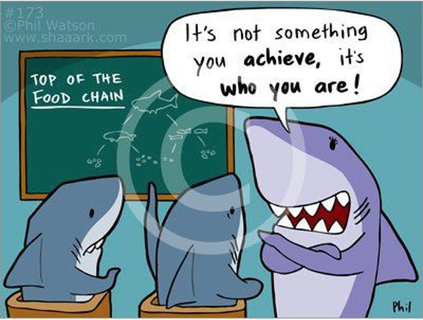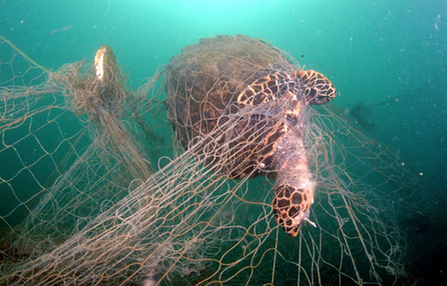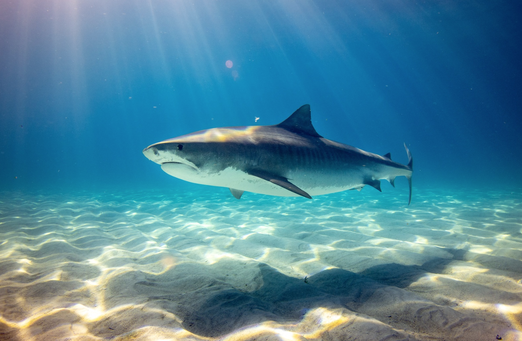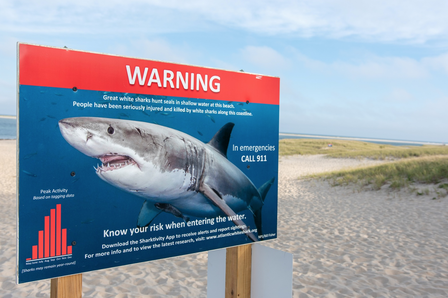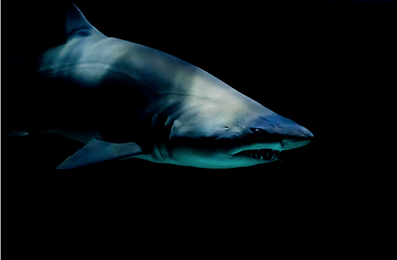 Photo by Laura College via Unsplash Photo by Laura College via Unsplash The ocean plays an integral role in sustaining our environment and climate, so do sharks and every other creature that lives below the surface. Life on earth depends on the delicate balance of this vast life support system. Sharks have gained an identity of the vengeful, bloodthirsty monsters of the deep, as portrayed by award-winning movies like Jaws. Ever since the movie, the box office has seen an onslaught of shark movies. The balance between the shark vs. human attacks has been shockingly disturbed by shark culling. Shark culling, also dubbed as the Shark Mitigation Strategy, is the deliberate killing of sharks by government authorities in response to shark attacks, often backed by public safety concerns (an effort to reduce shark attacks on public beaches). Shark exclusion nets and drumlines or traps are used to lure, entangle and kill sharks and other animals that pass near them. A drumline trap is made up of a large baited hook attached to a floating object that is then anchored to the seabed. These traps are designed to capture bull, tiger, or great white sharks off popular beaches. Legal shark culling is mainly practiced in four locations: New South Wales (Australia), Queensland (Australia), KwaZulu-Natal (South Africa), and Reunion Waters (France). The shark population has declined significantly in the number over the past few decades in Australia. Speaking of numbers... for the 12 lives taken by sharks in a year worldwide, 100 million sharks are culled by humans. In a report published in Communications Biology by the University of Queensland, researchers calculated that the catch population in the government-installed mesh nets has fallen by 70% in Queensland. From 1962 till 2018, Queensland authorities have killed over 50,000 sharks. How Does Shark Culling Affect the Ecosystem?As a keystone species, sharks are important for maintaining the delicate balance in the aquatic ecosystem. They help regulate the population and distribution of the species below them in the food chain, thus maintaining the diversity undersea. A 2008 report by Oceana, Predators as Prey: Why Healthy Oceans Need Sharks, highlights why we need to protect sharks. Sharks are so crucial for the ocean’s health that things will go out of balance if their numbers are reduced. A marine biologist from the School of BioSciences, University of Melbourne, Robert Day, says, “the top predators of the trophic levels in any ecosystem are critical because they decide on whether other species thrive or not.” Sharks prey on old, diseased, or weak creatures, thus maintaining the healthful gene pool. Feeding on scavenges, they keep the ocean waters clear of debris. The falling numbers of apex predators could have far-reaching and devastating effects on marine life. “If the number of sharks in the ocean declines, then other predatory fish species will become abundant that feed on the herbivores and scour too many smaller organisms such that the whole ecosystem would change,” Dr Roberts added. Reasons Why or Why Not Sharks Should be CulledThe unprovoked shark attacks incited surfers to call for shark culls in Reunion Waters and other places worldwide. Among the advocates was the world-renowned surf champion and climate activist, Kelly Slater. The impassioned statement for the mass shark cull on Reunion Island coming from such an environmental enthusiast, well-known for clothing brand Outerknown tagline, “it’s not okay” (to destroy our oceans), stunned the world. The call for a massive cull was backed by the fatal shark attacks in the surrounding waters. The Australian Environment Ministry also considered a massive shark cull program in Western Australia in 2014 after seven fatal deaths were reported by shark attacks over the past three years. However, the decision stirred up an intense debate for and against shark culling with fierce representations and opinions on both ends of the table. The decision was condemned by the environmentalist, conservationist, and native Australians alike, with over 80% of opposition from the community. Those in opposition argue on the lack of scientific evidence for the approach’s efficiency and moral grounds. Let’s start with the fact that we’re protecting different animal species; why shouldn’t we protect sharks? There are several creatures, as small as microscopic infectious viruses to as big as hippopotamuses, that had befallen death on our loved one, should we remove them all off the face of the earth? Though we all feel that way about losing our close friends and relatives, would it be a rational decision? Can’t we co-exist peacefully using appropriate measures that keep us safe and sharks alive? Is Shark Culling an Effective Strategy?You might be thinking that culling sharks would decrease the risk of attack, however, that’s not the case. There is no need for shark culls. As per Shark Attack File (a site that tracks attacks and fatalities by sharks across Australia), there is an average of 10 fatalities per year due to shark attacks globally, compared to the approximately 100 million sharks killed by humans annually for food, sport, and safety. The efficiency of the shark nets and drum lines as deterrents is also questionable. These measures are dangerous to other sea creatures like rays, turtles, dolphins, and small, harmless sharks, which get caught up in the traps. Shark culling is not a pragmatic solution... The traps with a baited hook that are used to attract and snare sharks instead trap them on the ocean floor, leaving them unable to swim. They are then deprived of oxygen and slowly drown to death or are left to be culled by the authorities. The giant nets are also problematic because other small creatures get trapped and are then killed. The WA Fisheries minister highlighted the need to concentrate and invest in new and emerging technologies that offer real protection for the people who are most at risk, i.e., surfers and swimmers. The statement, however, was twisted by a local newspaper writer as the lives of sharks are more important than humans. The founder of No Shark Cull, Natalie Banks, testified the statement saying that the use of shark hooks has never proven to work. In Hawaii, almost 5,000 sharks were culled between 1959 and 1976 (18 years) with no reduction in shark bites. Even the 2014 Western Australian shark cull campaign that killed over 50 sharks in three months bred no reductions in shark bites. To add to the insult, all of the victims were from near-threatened tiger shark species instead of the targeted great white shark. This led to the termination of the three-year program after only three months. Why Should we Stop Killing Sharks?The proposition for shark culling has been widely opposed by environmentalists, conservationists, and most policymakers. Senate inquiry has been looking into available options to minimize the risk of shark attacks. Although surfers have called for more drastic actions, like culling in coastal areas, which is an understandable response to such a monstrous predator, there’s no evidence that the falling numbers will reduce the likelihood of shark attacks. Often inhumanely culled for their notorious "monstrous predator” notion, sharks need conservation more than ever. We need sharks for maintaining the integrity of our ecosystem. Understanding the importance of sharks for our oceans’ health is a driving force behind various shark conservation policies. “Sharks keep our oceans and reefs healthy,” says No Shark Cull founder Natalie Banks, “the steep decline in some species of shark could effectively result in dead zones in the oceans providing no fish for human and animal consumption and a lack of good quality water and oxygen.” Sharks should not be culled because; 1. Oceans are the natural habitat of sharks where they swim and scour food. 2. Sharks are the top predators of the aquatic ecosystem. 3. Sharks are essential to the marine ecosystem because they control the diversity and abundance of other species. 4. Of 480 shark species, only three are involved in unprovoked attacks. These are the great white shark, the tiger shark, and the bull shark. The rest are placid and gentle, like the whale shark. 5. Sharks culling is ineffective because sharks will always keep returning to surfing/swimming zones since it is part of their natural environment. Sharks have existed for more than 420 million years, survived mass extinctions, with the possible exception of the one that’s unfurling right now; the Holocene extinction. According to the National Geographic estimates, we have already wiped out 90% of the world’s sharks. The notion of culling sharks just because they interfere with our water sports is obscene. However, are they interfering with our sports, or is it the other way round? The decline in herbivores fosters macroalgae that results in algae-dominant ecosystems. This is affecting the survival of the reef system in the long run. In Reunion’s waters, removing the predator reef shark has resulted in the invasion of a new competitor which is the non-native, beady-eyed Bull Shark. However, the prey fish they’re competing for is long gone. Inhabiting the muddy, murky waters, wily sharks offer a deadly bite to everyone, even other sharks. Other research suggests killing sharks actually worsens climate change. The vegetated coastal habitats store 50% or about 25 billion tonnes of the carbon present in all ocean sediments. It is estimated that the loss of 1% coastal vegetation could result in the release of 460 metric tonnes of CO2. A paper published by a team of researchers from Deakin University, University of Technology, Sydney, Griffith University, and Utah State University in "Nature Climate Change," warns that the declining population of top ocean predators, i.e. sharks, causes a “trophic cascade” throughout the food chain that results in the release of carbon into the atmosphere. With about 90% of the world’s sharks and other large predatory fish wiped out through overfishing and culling, prey such as sea turtles and crabs have flourished. Free of shark harassment, turtles are munching seagrass, and crabs have been disrupting seabed sediment. Such ecological changes have indirect adverse effects on carbon cycling and, in the longer run, affect our ability to reduce climate change impacts. Removal of large ocean predators causes a meltdown in the delicate oceanic ecosystem that influences the carbon emissions, “and that’s exactly what’s happening in Australia,” said Dr Peter Macreadie, co-author of the paper. The predatory role of sharks is also significant for the world’s economy. The loss of great white sharks has increased the subsequent ray population who feed on bay scallops and other bivalves. The disappearance of scallops and clams in the restaurants is an indicator of the declining shark population. How Can we Help Sharks?Overfishing, shark finning, climate change, black market trade, and habitat loss have had a massive effect on sharks. Sharks are long-lived and slow-growing. Most shark species take longer to reach maturity, especially the larger species such as bull shark, who take about 15 years to reach maturity. And, sharks are being caught faster than they can mature. We need to avoid shark culls and give them enough time to survive, grow, and reproduce. The use of nets and baited drum lines is an outdated and ineffective approach against shark attacks. We need to take shark culling off the table and look for innovative, non-lethal shark control measures and better general public awareness to co-exist peacefully with sharks and other marine life. Things that can help sharks, and of course, help us avoid unnecessary shark attacks include;
Bottom LineJust as we cannot scare our kids that they cannot go in the water or they’ll get chopped in half, we don’t have control over the oceans; that’s their home. Furthermore, there’s a massive potential to offset carbon emissions by maintaining aquatic ecosystems and seagrass. We need to protect sharks to protect our environment. AuthorNida Riaz is a freelance blogger based in Pakistan. She started writing about her passion for the environment when the world came to a stop in early 2020.
0 Comments
Leave a Reply. |
|
|
(833) CMS-LINE
(833) 267-5463 PO Box 13477 Mill Creek, Wa, 98082 © Conservation Made Simple. All rights reserved.
501(c)(3) Non-Profit, Tax ID#: 82-1646340 Copyright © 2021 Conservation Made Simple |

